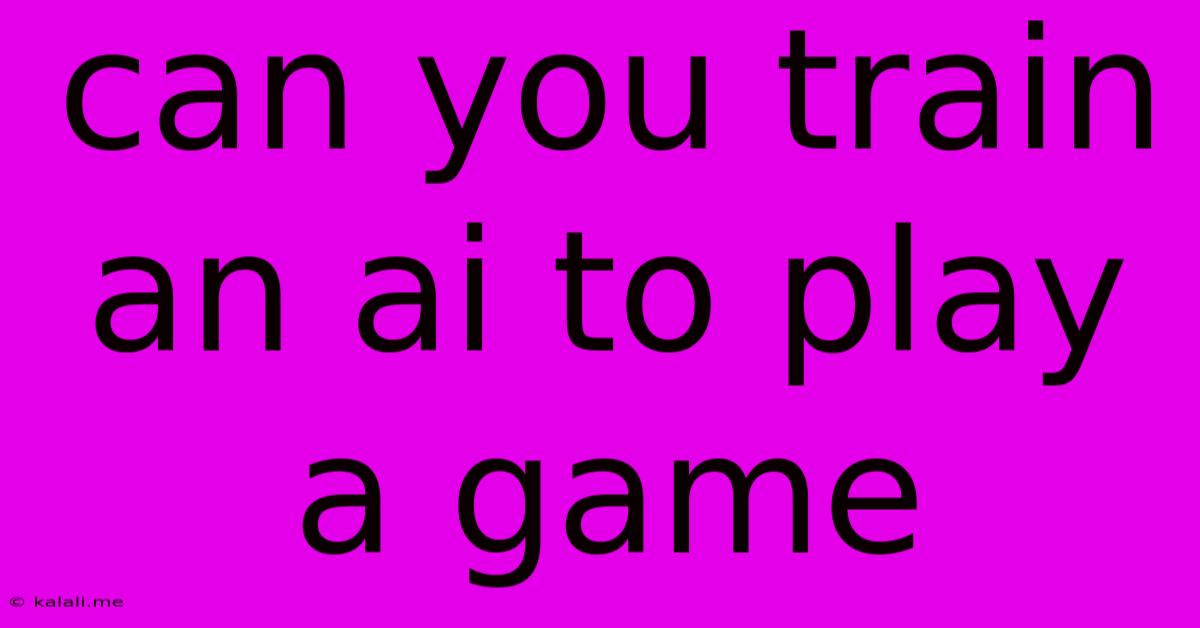Can You Train An Ai To Play A Game
Kalali
Jun 02, 2025 · 3 min read

Table of Contents
Can You Train an AI to Play a Game? A Deep Dive into AI Game Playing
Can you train an AI to play a game? The short answer is a resounding yes. But the "how" is far more complex and fascinating than a simple yes or no. This article will explore the different methods used to train AI to master games, from simple board games to complex video games, highlighting the techniques and challenges involved. The ability to train AI to play games has significant implications beyond entertainment, offering insights into artificial intelligence, machine learning, and even problem-solving strategies applicable to various fields.
This exploration will cover various methods and their implications, helping you understand the core principles behind AI game playing. We will delve into the intricacies of reinforcement learning, supervised learning, and evolutionary algorithms, showcasing their strengths and weaknesses in different game contexts.
Reinforcement Learning: Trial and Error to Mastery
Reinforcement learning (RL) is a dominant approach in training AI to play games. It mimics the human learning process: through trial and error. The AI agent interacts with the game environment, receives rewards for positive actions and penalties for negative ones. Over time, the agent learns to maximize its cumulative reward, effectively mastering the game's strategy. Examples include DeepMind's AlphaGo, which famously defeated a Go world champion, and AlphaZero, a more general algorithm capable of mastering chess and shogi with minimal prior knowledge.
Key Concepts in RL for Game Playing:
- Reward Function: Defines what constitutes a "good" or "bad" action within the game.
- State Space: Represents all possible configurations of the game.
- Action Space: Represents all possible moves the agent can make.
- Policy: The strategy the agent learns to maximize its reward.
- Value Function: Estimates the expected reward from a given state.
Supervised Learning: Learning from Expert Data
Supervised learning offers an alternative approach. Instead of learning through trial and error, the AI is trained on a dataset of expert game play. This dataset could consist of human expert games or even data generated by a strong RL agent. The AI learns to mimic the expert's strategies, effectively replicating their gameplay. This method is particularly useful when generating large datasets is feasible and the game's rules are well-defined.
Evolutionary Algorithms: Survival of the Fittest AI
Evolutionary algorithms leverage the principles of natural selection to train AI game players. A population of AI agents is generated, each with slightly different strategies. These agents compete against each other, and the most successful ones are selected to reproduce, passing on their "genes" (parameters defining their strategy) to the next generation. Over many generations, the AI agents evolve, becoming increasingly adept at playing the game. This method is particularly useful for games with complex rule sets or large state spaces.
Challenges and Future Directions
While significant progress has been made, training AI to play games still faces challenges:
- Computational Cost: Training advanced AI agents, especially using RL, can require substantial computational resources.
- Generalization: An AI trained to play one game may not generalize well to another, even if the games share similarities.
- Explainability: Understanding why an AI makes certain decisions can be difficult, particularly with complex algorithms like deep neural networks.
Future research focuses on creating more efficient and generalizable AI agents, improving explainability, and exploring new algorithms for tackling even more complex games and real-world problems. The ability to train AI to play games is not just a fascinating technological achievement; it's a stepping stone towards developing more robust and intelligent AI systems with applications across diverse fields.
Latest Posts
Latest Posts
-
Who Was The Homeless Woman On Sons Of Anarchy
Jun 04, 2025
-
White Spots On My Rose Bush Leaves
Jun 04, 2025
-
Can Others Ride The Drakewarden Drake
Jun 04, 2025
-
Is 3 7 Gpa Competitive For Grad School
Jun 04, 2025
-
How To Say Is In Latin
Jun 04, 2025
Related Post
Thank you for visiting our website which covers about Can You Train An Ai To Play A Game . We hope the information provided has been useful to you. Feel free to contact us if you have any questions or need further assistance. See you next time and don't miss to bookmark.